Management Theory and Practice: An Evolution Presentation
VerifiedAdded on 2022/12/12
|10
|2692
|233
Presentation
AI Summary
This presentation examines the evolution of management theory and its practical applications within organizations. It begins with an introduction to various management practices and their importance in shaping employee behavior and organizational growth. The presentation delves into organizational psychology, exploring topics such as social identity at work, social cognition, and social thinking. It analyzes the role of power as a central force in organizational life, discussing reward and coercive power, as well as the relationship between power and ethical behavior. The presentation also addresses workplace conflict, including constructive, destructive, and asymmetric conflicts, and examines cognitive and behavioral reactions to threats. Finally, it highlights the importance of intergroup dynamics in resolving organizational problems, emphasizing teamwork and psychological relationships between groups.
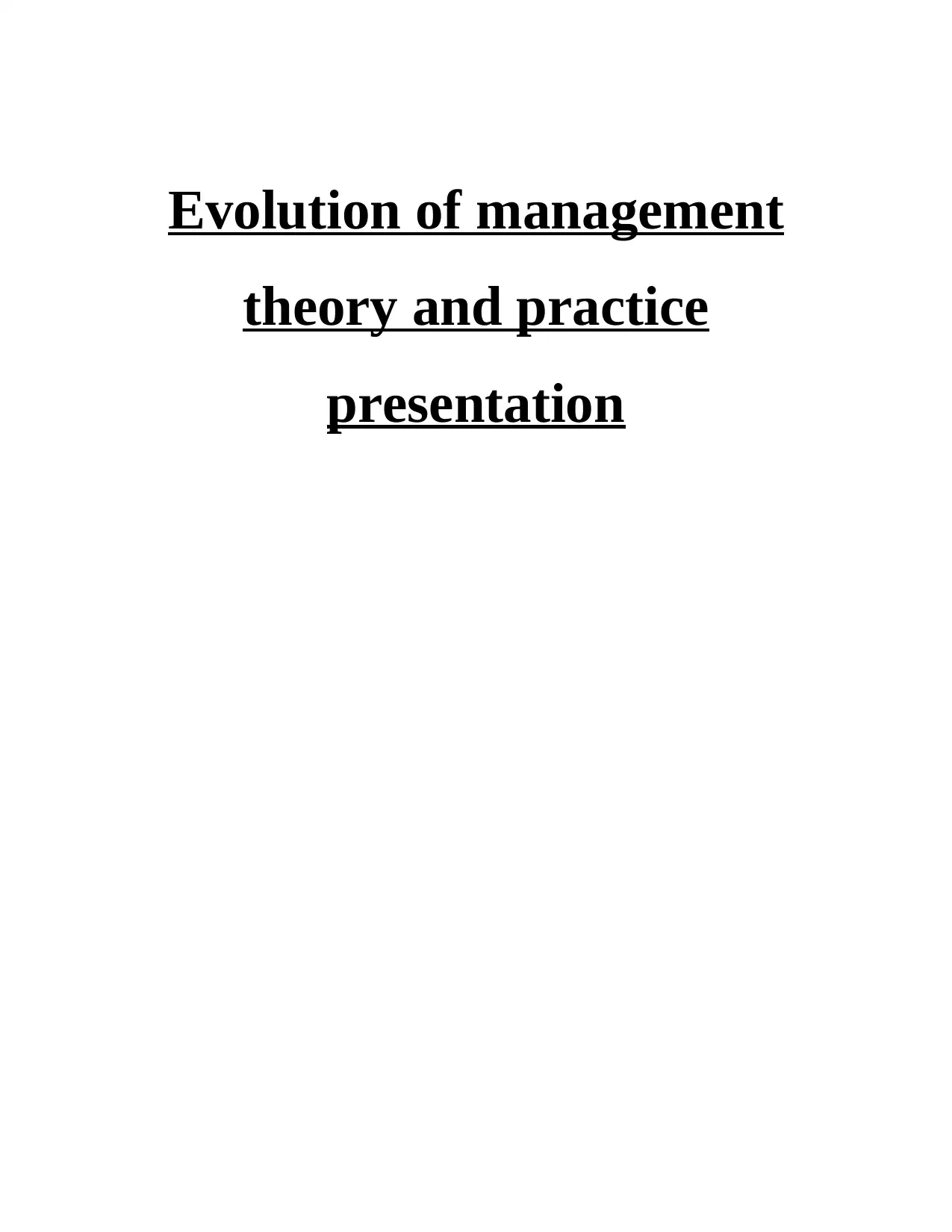
Evolution of management
theory and practice
presentation
theory and practice
presentation
Paraphrase This Document
Need a fresh take? Get an instant paraphrase of this document with our AI Paraphraser
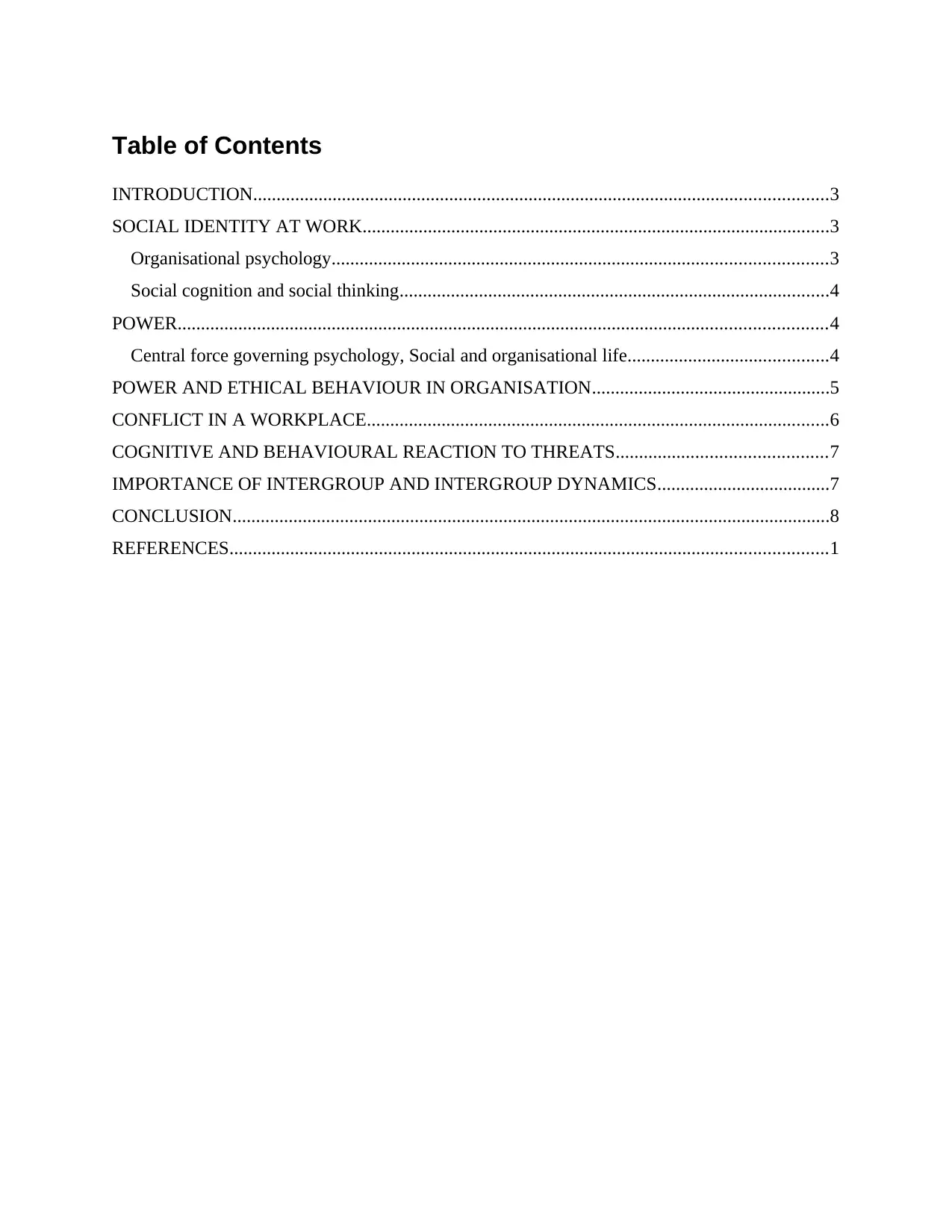
Table of Contents
INTRODUCTION...........................................................................................................................3
SOCIAL IDENTITY AT WORK....................................................................................................3
Organisational psychology..........................................................................................................3
Social cognition and social thinking............................................................................................4
POWER...........................................................................................................................................4
Central force governing psychology, Social and organisational life...........................................4
POWER AND ETHICAL BEHAVIOUR IN ORGANISATION...................................................5
CONFLICT IN A WORKPLACE...................................................................................................6
COGNITIVE AND BEHAVIOURAL REACTION TO THREATS.............................................7
IMPORTANCE OF INTERGROUP AND INTERGROUP DYNAMICS.....................................7
CONCLUSION................................................................................................................................8
REFERENCES................................................................................................................................1
INTRODUCTION...........................................................................................................................3
SOCIAL IDENTITY AT WORK....................................................................................................3
Organisational psychology..........................................................................................................3
Social cognition and social thinking............................................................................................4
POWER...........................................................................................................................................4
Central force governing psychology, Social and organisational life...........................................4
POWER AND ETHICAL BEHAVIOUR IN ORGANISATION...................................................5
CONFLICT IN A WORKPLACE...................................................................................................6
COGNITIVE AND BEHAVIOURAL REACTION TO THREATS.............................................7
IMPORTANCE OF INTERGROUP AND INTERGROUP DYNAMICS.....................................7
CONCLUSION................................................................................................................................8
REFERENCES................................................................................................................................1
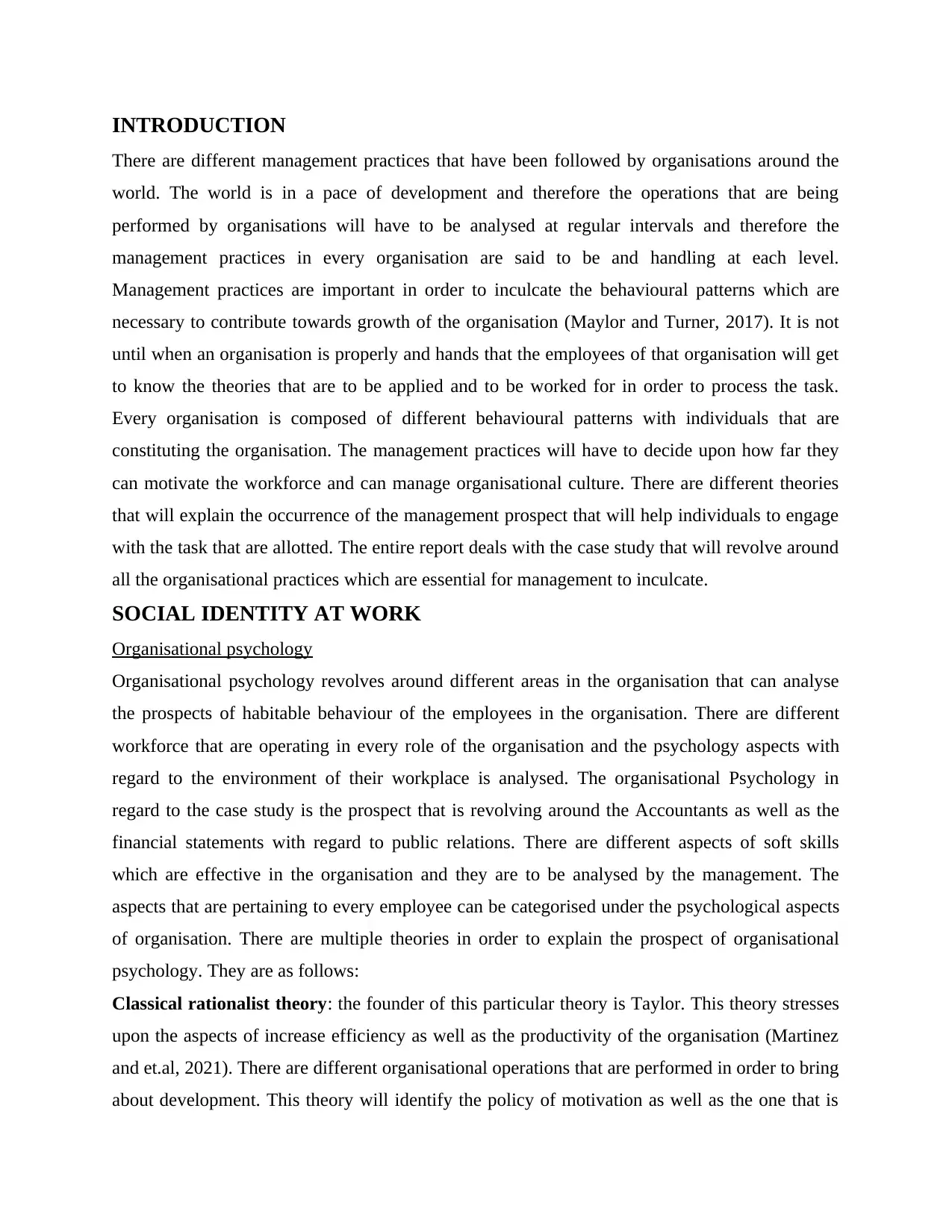
INTRODUCTION
There are different management practices that have been followed by organisations around the
world. The world is in a pace of development and therefore the operations that are being
performed by organisations will have to be analysed at regular intervals and therefore the
management practices in every organisation are said to be and handling at each level.
Management practices are important in order to inculcate the behavioural patterns which are
necessary to contribute towards growth of the organisation (Maylor and Turner, 2017). It is not
until when an organisation is properly and hands that the employees of that organisation will get
to know the theories that are to be applied and to be worked for in order to process the task.
Every organisation is composed of different behavioural patterns with individuals that are
constituting the organisation. The management practices will have to decide upon how far they
can motivate the workforce and can manage organisational culture. There are different theories
that will explain the occurrence of the management prospect that will help individuals to engage
with the task that are allotted. The entire report deals with the case study that will revolve around
all the organisational practices which are essential for management to inculcate.
SOCIAL IDENTITY AT WORK
Organisational psychology
Organisational psychology revolves around different areas in the organisation that can analyse
the prospects of habitable behaviour of the employees in the organisation. There are different
workforce that are operating in every role of the organisation and the psychology aspects with
regard to the environment of their workplace is analysed. The organisational Psychology in
regard to the case study is the prospect that is revolving around the Accountants as well as the
financial statements with regard to public relations. There are different aspects of soft skills
which are effective in the organisation and they are to be analysed by the management. The
aspects that are pertaining to every employee can be categorised under the psychological aspects
of organisation. There are multiple theories in order to explain the prospect of organisational
psychology. They are as follows:
Classical rationalist theory: the founder of this particular theory is Taylor. This theory stresses
upon the aspects of increase efficiency as well as the productivity of the organisation (Martinez
and et.al, 2021). There are different organisational operations that are performed in order to bring
about development. This theory will identify the policy of motivation as well as the one that is
There are different management practices that have been followed by organisations around the
world. The world is in a pace of development and therefore the operations that are being
performed by organisations will have to be analysed at regular intervals and therefore the
management practices in every organisation are said to be and handling at each level.
Management practices are important in order to inculcate the behavioural patterns which are
necessary to contribute towards growth of the organisation (Maylor and Turner, 2017). It is not
until when an organisation is properly and hands that the employees of that organisation will get
to know the theories that are to be applied and to be worked for in order to process the task.
Every organisation is composed of different behavioural patterns with individuals that are
constituting the organisation. The management practices will have to decide upon how far they
can motivate the workforce and can manage organisational culture. There are different theories
that will explain the occurrence of the management prospect that will help individuals to engage
with the task that are allotted. The entire report deals with the case study that will revolve around
all the organisational practices which are essential for management to inculcate.
SOCIAL IDENTITY AT WORK
Organisational psychology
Organisational psychology revolves around different areas in the organisation that can analyse
the prospects of habitable behaviour of the employees in the organisation. There are different
workforce that are operating in every role of the organisation and the psychology aspects with
regard to the environment of their workplace is analysed. The organisational Psychology in
regard to the case study is the prospect that is revolving around the Accountants as well as the
financial statements with regard to public relations. There are different aspects of soft skills
which are effective in the organisation and they are to be analysed by the management. The
aspects that are pertaining to every employee can be categorised under the psychological aspects
of organisation. There are multiple theories in order to explain the prospect of organisational
psychology. They are as follows:
Classical rationalist theory: the founder of this particular theory is Taylor. This theory stresses
upon the aspects of increase efficiency as well as the productivity of the organisation (Martinez
and et.al, 2021). There are different organisational operations that are performed in order to bring
about development. This theory will identify the policy of motivation as well as the one that is
⊘ This is a preview!⊘
Do you want full access?
Subscribe today to unlock all pages.

Trusted by 1+ million students worldwide
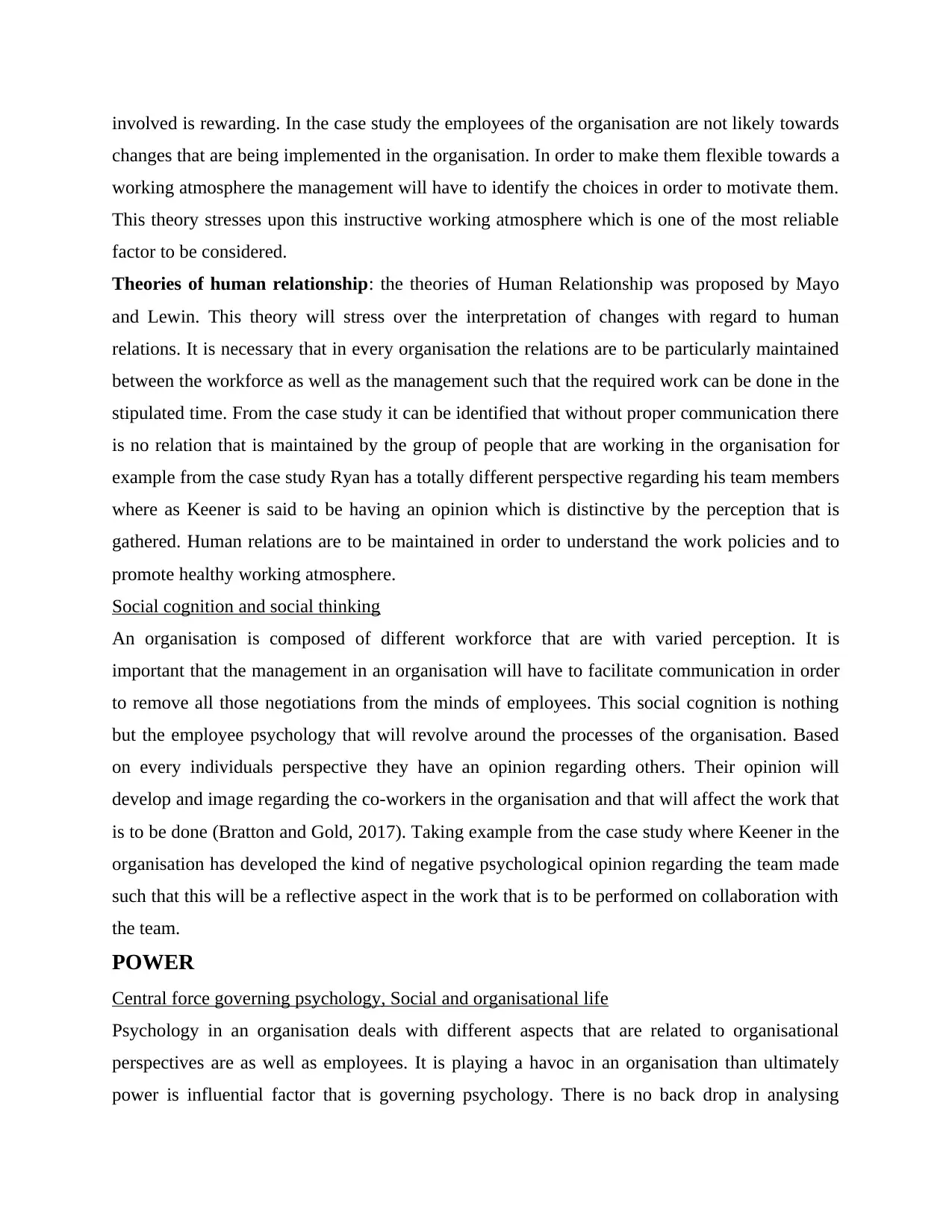
involved is rewarding. In the case study the employees of the organisation are not likely towards
changes that are being implemented in the organisation. In order to make them flexible towards a
working atmosphere the management will have to identify the choices in order to motivate them.
This theory stresses upon this instructive working atmosphere which is one of the most reliable
factor to be considered.
Theories of human relationship: the theories of Human Relationship was proposed by Mayo
and Lewin. This theory will stress over the interpretation of changes with regard to human
relations. It is necessary that in every organisation the relations are to be particularly maintained
between the workforce as well as the management such that the required work can be done in the
stipulated time. From the case study it can be identified that without proper communication there
is no relation that is maintained by the group of people that are working in the organisation for
example from the case study Ryan has a totally different perspective regarding his team members
where as Keener is said to be having an opinion which is distinctive by the perception that is
gathered. Human relations are to be maintained in order to understand the work policies and to
promote healthy working atmosphere.
Social cognition and social thinking
An organisation is composed of different workforce that are with varied perception. It is
important that the management in an organisation will have to facilitate communication in order
to remove all those negotiations from the minds of employees. This social cognition is nothing
but the employee psychology that will revolve around the processes of the organisation. Based
on every individuals perspective they have an opinion regarding others. Their opinion will
develop and image regarding the co-workers in the organisation and that will affect the work that
is to be done (Bratton and Gold, 2017). Taking example from the case study where Keener in the
organisation has developed the kind of negative psychological opinion regarding the team made
such that this will be a reflective aspect in the work that is to be performed on collaboration with
the team.
POWER
Central force governing psychology, Social and organisational life
Psychology in an organisation deals with different aspects that are related to organisational
perspectives are as well as employees. It is playing a havoc in an organisation than ultimately
power is influential factor that is governing psychology. There is no back drop in analysing
changes that are being implemented in the organisation. In order to make them flexible towards a
working atmosphere the management will have to identify the choices in order to motivate them.
This theory stresses upon this instructive working atmosphere which is one of the most reliable
factor to be considered.
Theories of human relationship: the theories of Human Relationship was proposed by Mayo
and Lewin. This theory will stress over the interpretation of changes with regard to human
relations. It is necessary that in every organisation the relations are to be particularly maintained
between the workforce as well as the management such that the required work can be done in the
stipulated time. From the case study it can be identified that without proper communication there
is no relation that is maintained by the group of people that are working in the organisation for
example from the case study Ryan has a totally different perspective regarding his team members
where as Keener is said to be having an opinion which is distinctive by the perception that is
gathered. Human relations are to be maintained in order to understand the work policies and to
promote healthy working atmosphere.
Social cognition and social thinking
An organisation is composed of different workforce that are with varied perception. It is
important that the management in an organisation will have to facilitate communication in order
to remove all those negotiations from the minds of employees. This social cognition is nothing
but the employee psychology that will revolve around the processes of the organisation. Based
on every individuals perspective they have an opinion regarding others. Their opinion will
develop and image regarding the co-workers in the organisation and that will affect the work that
is to be done (Bratton and Gold, 2017). Taking example from the case study where Keener in the
organisation has developed the kind of negative psychological opinion regarding the team made
such that this will be a reflective aspect in the work that is to be performed on collaboration with
the team.
POWER
Central force governing psychology, Social and organisational life
Psychology in an organisation deals with different aspects that are related to organisational
perspectives are as well as employees. It is playing a havoc in an organisation than ultimately
power is influential factor that is governing psychology. There is no back drop in analysing
Paraphrase This Document
Need a fresh take? Get an instant paraphrase of this document with our AI Paraphraser
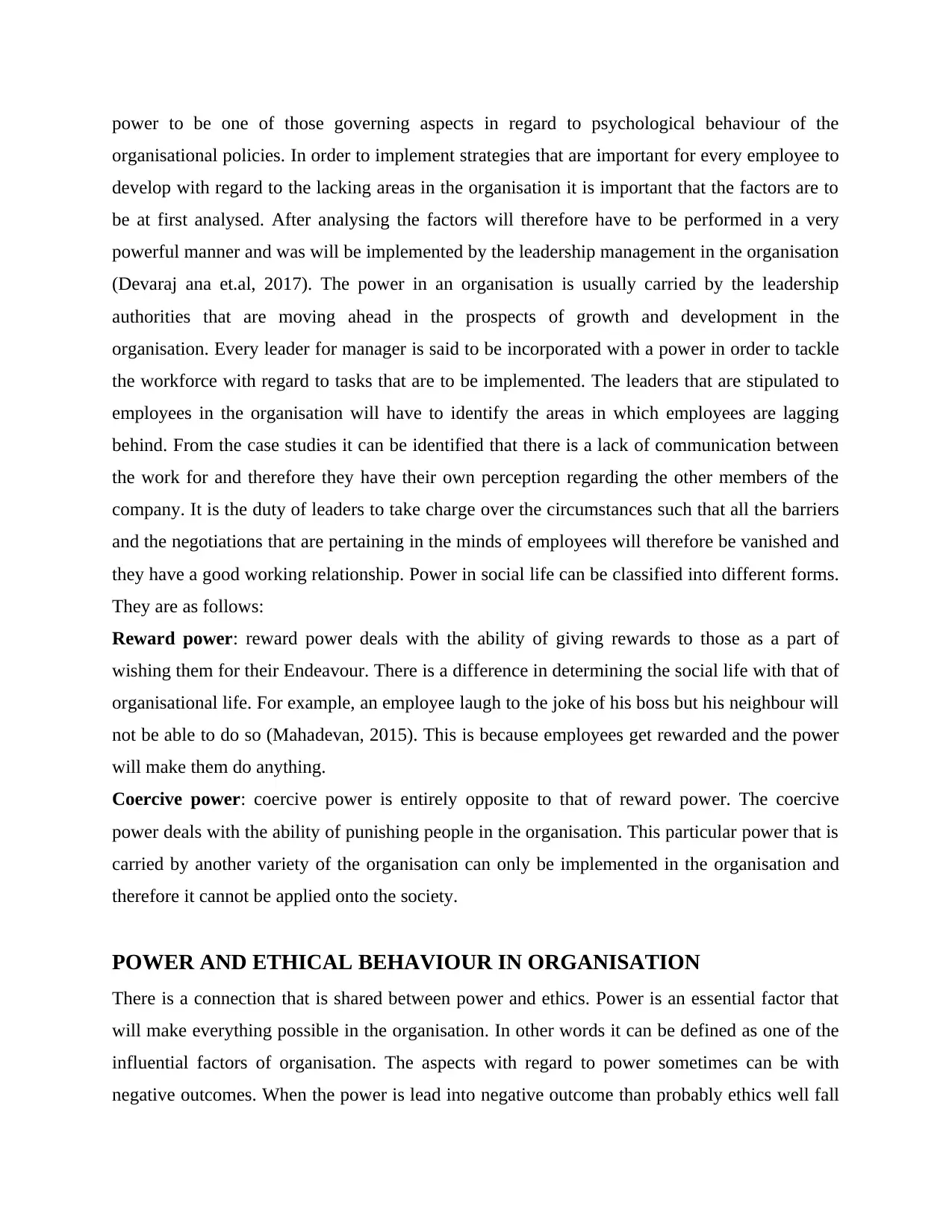
power to be one of those governing aspects in regard to psychological behaviour of the
organisational policies. In order to implement strategies that are important for every employee to
develop with regard to the lacking areas in the organisation it is important that the factors are to
be at first analysed. After analysing the factors will therefore have to be performed in a very
powerful manner and was will be implemented by the leadership management in the organisation
(Devaraj ana et.al, 2017). The power in an organisation is usually carried by the leadership
authorities that are moving ahead in the prospects of growth and development in the
organisation. Every leader for manager is said to be incorporated with a power in order to tackle
the workforce with regard to tasks that are to be implemented. The leaders that are stipulated to
employees in the organisation will have to identify the areas in which employees are lagging
behind. From the case studies it can be identified that there is a lack of communication between
the work for and therefore they have their own perception regarding the other members of the
company. It is the duty of leaders to take charge over the circumstances such that all the barriers
and the negotiations that are pertaining in the minds of employees will therefore be vanished and
they have a good working relationship. Power in social life can be classified into different forms.
They are as follows:
Reward power: reward power deals with the ability of giving rewards to those as a part of
wishing them for their Endeavour. There is a difference in determining the social life with that of
organisational life. For example, an employee laugh to the joke of his boss but his neighbour will
not be able to do so (Mahadevan, 2015). This is because employees get rewarded and the power
will make them do anything.
Coercive power: coercive power is entirely opposite to that of reward power. The coercive
power deals with the ability of punishing people in the organisation. This particular power that is
carried by another variety of the organisation can only be implemented in the organisation and
therefore it cannot be applied onto the society.
POWER AND ETHICAL BEHAVIOUR IN ORGANISATION
There is a connection that is shared between power and ethics. Power is an essential factor that
will make everything possible in the organisation. In other words it can be defined as one of the
influential factors of organisation. The aspects with regard to power sometimes can be with
negative outcomes. When the power is lead into negative outcome than probably ethics well fall
organisational policies. In order to implement strategies that are important for every employee to
develop with regard to the lacking areas in the organisation it is important that the factors are to
be at first analysed. After analysing the factors will therefore have to be performed in a very
powerful manner and was will be implemented by the leadership management in the organisation
(Devaraj ana et.al, 2017). The power in an organisation is usually carried by the leadership
authorities that are moving ahead in the prospects of growth and development in the
organisation. Every leader for manager is said to be incorporated with a power in order to tackle
the workforce with regard to tasks that are to be implemented. The leaders that are stipulated to
employees in the organisation will have to identify the areas in which employees are lagging
behind. From the case studies it can be identified that there is a lack of communication between
the work for and therefore they have their own perception regarding the other members of the
company. It is the duty of leaders to take charge over the circumstances such that all the barriers
and the negotiations that are pertaining in the minds of employees will therefore be vanished and
they have a good working relationship. Power in social life can be classified into different forms.
They are as follows:
Reward power: reward power deals with the ability of giving rewards to those as a part of
wishing them for their Endeavour. There is a difference in determining the social life with that of
organisational life. For example, an employee laugh to the joke of his boss but his neighbour will
not be able to do so (Mahadevan, 2015). This is because employees get rewarded and the power
will make them do anything.
Coercive power: coercive power is entirely opposite to that of reward power. The coercive
power deals with the ability of punishing people in the organisation. This particular power that is
carried by another variety of the organisation can only be implemented in the organisation and
therefore it cannot be applied onto the society.
POWER AND ETHICAL BEHAVIOUR IN ORGANISATION
There is a connection that is shared between power and ethics. Power is an essential factor that
will make everything possible in the organisation. In other words it can be defined as one of the
influential factors of organisation. The aspects with regard to power sometimes can be with
negative outcomes. When the power is lead into negative outcome than probably ethics well fall
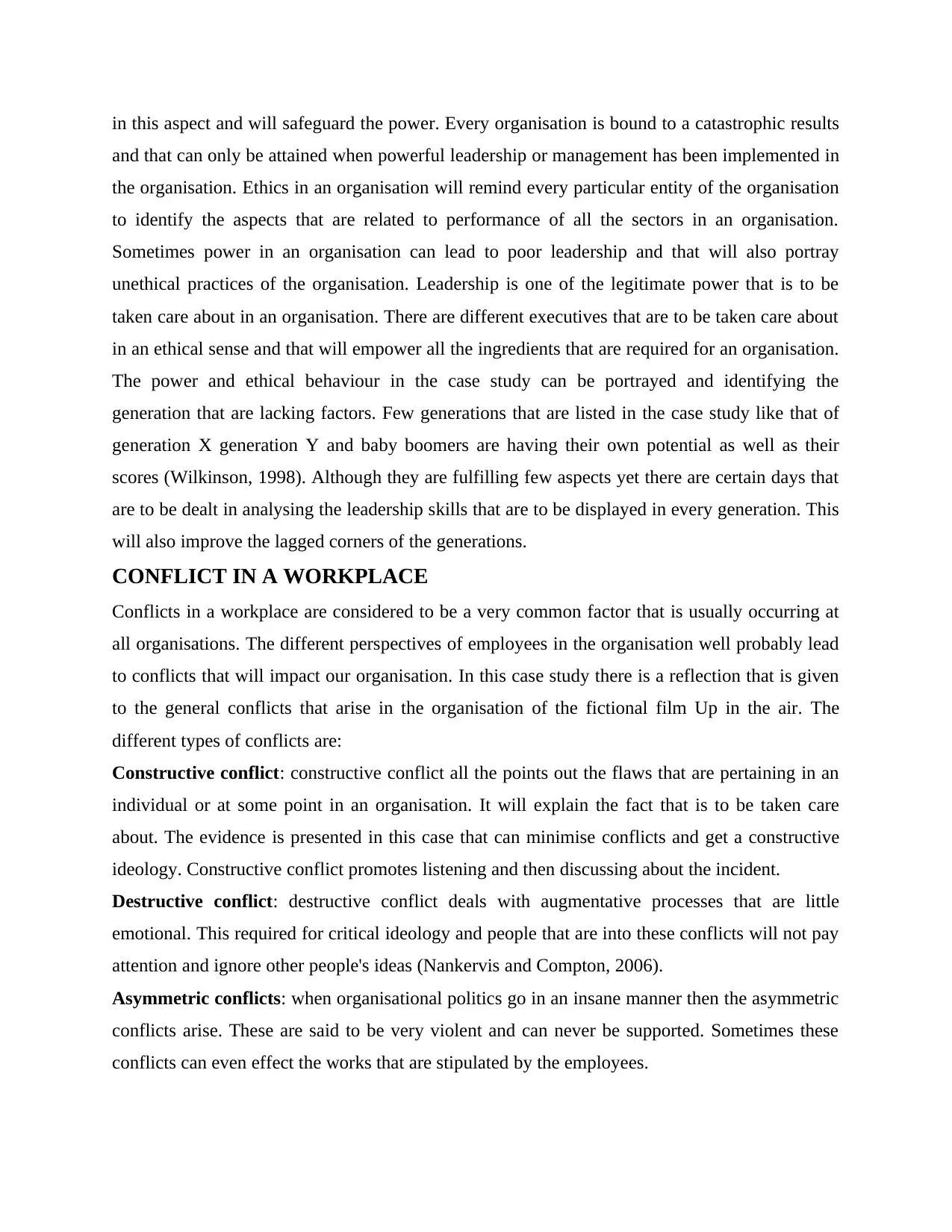
in this aspect and will safeguard the power. Every organisation is bound to a catastrophic results
and that can only be attained when powerful leadership or management has been implemented in
the organisation. Ethics in an organisation will remind every particular entity of the organisation
to identify the aspects that are related to performance of all the sectors in an organisation.
Sometimes power in an organisation can lead to poor leadership and that will also portray
unethical practices of the organisation. Leadership is one of the legitimate power that is to be
taken care about in an organisation. There are different executives that are to be taken care about
in an ethical sense and that will empower all the ingredients that are required for an organisation.
The power and ethical behaviour in the case study can be portrayed and identifying the
generation that are lacking factors. Few generations that are listed in the case study like that of
generation X generation Y and baby boomers are having their own potential as well as their
scores (Wilkinson, 1998). Although they are fulfilling few aspects yet there are certain days that
are to be dealt in analysing the leadership skills that are to be displayed in every generation. This
will also improve the lagged corners of the generations.
CONFLICT IN A WORKPLACE
Conflicts in a workplace are considered to be a very common factor that is usually occurring at
all organisations. The different perspectives of employees in the organisation well probably lead
to conflicts that will impact our organisation. In this case study there is a reflection that is given
to the general conflicts that arise in the organisation of the fictional film Up in the air. The
different types of conflicts are:
Constructive conflict: constructive conflict all the points out the flaws that are pertaining in an
individual or at some point in an organisation. It will explain the fact that is to be taken care
about. The evidence is presented in this case that can minimise conflicts and get a constructive
ideology. Constructive conflict promotes listening and then discussing about the incident.
Destructive conflict: destructive conflict deals with augmentative processes that are little
emotional. This required for critical ideology and people that are into these conflicts will not pay
attention and ignore other people's ideas (Nankervis and Compton, 2006).
Asymmetric conflicts: when organisational politics go in an insane manner then the asymmetric
conflicts arise. These are said to be very violent and can never be supported. Sometimes these
conflicts can even effect the works that are stipulated by the employees.
and that can only be attained when powerful leadership or management has been implemented in
the organisation. Ethics in an organisation will remind every particular entity of the organisation
to identify the aspects that are related to performance of all the sectors in an organisation.
Sometimes power in an organisation can lead to poor leadership and that will also portray
unethical practices of the organisation. Leadership is one of the legitimate power that is to be
taken care about in an organisation. There are different executives that are to be taken care about
in an ethical sense and that will empower all the ingredients that are required for an organisation.
The power and ethical behaviour in the case study can be portrayed and identifying the
generation that are lacking factors. Few generations that are listed in the case study like that of
generation X generation Y and baby boomers are having their own potential as well as their
scores (Wilkinson, 1998). Although they are fulfilling few aspects yet there are certain days that
are to be dealt in analysing the leadership skills that are to be displayed in every generation. This
will also improve the lagged corners of the generations.
CONFLICT IN A WORKPLACE
Conflicts in a workplace are considered to be a very common factor that is usually occurring at
all organisations. The different perspectives of employees in the organisation well probably lead
to conflicts that will impact our organisation. In this case study there is a reflection that is given
to the general conflicts that arise in the organisation of the fictional film Up in the air. The
different types of conflicts are:
Constructive conflict: constructive conflict all the points out the flaws that are pertaining in an
individual or at some point in an organisation. It will explain the fact that is to be taken care
about. The evidence is presented in this case that can minimise conflicts and get a constructive
ideology. Constructive conflict promotes listening and then discussing about the incident.
Destructive conflict: destructive conflict deals with augmentative processes that are little
emotional. This required for critical ideology and people that are into these conflicts will not pay
attention and ignore other people's ideas (Nankervis and Compton, 2006).
Asymmetric conflicts: when organisational politics go in an insane manner then the asymmetric
conflicts arise. These are said to be very violent and can never be supported. Sometimes these
conflicts can even effect the works that are stipulated by the employees.
⊘ This is a preview!⊘
Do you want full access?
Subscribe today to unlock all pages.

Trusted by 1+ million students worldwide
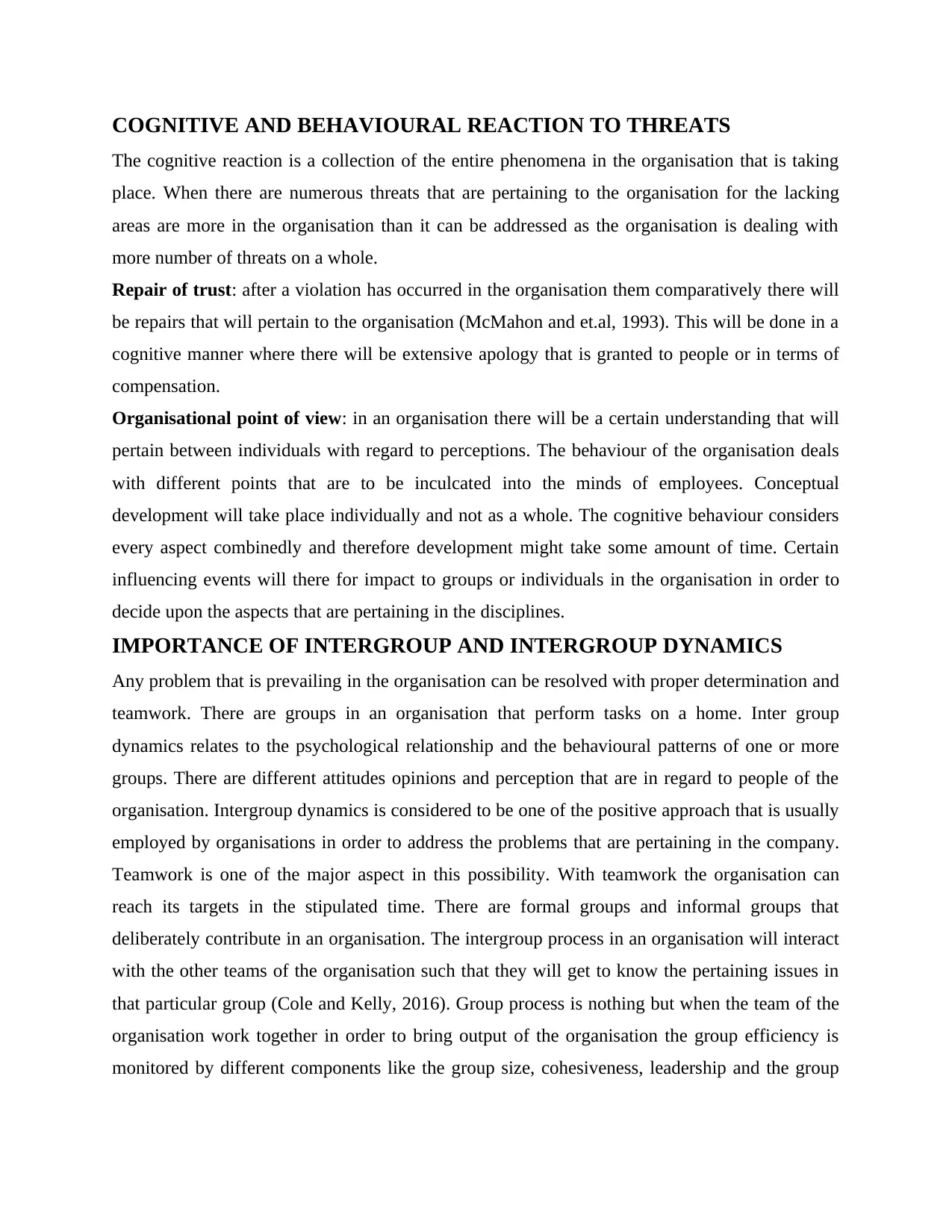
COGNITIVE AND BEHAVIOURAL REACTION TO THREATS
The cognitive reaction is a collection of the entire phenomena in the organisation that is taking
place. When there are numerous threats that are pertaining to the organisation for the lacking
areas are more in the organisation than it can be addressed as the organisation is dealing with
more number of threats on a whole.
Repair of trust: after a violation has occurred in the organisation them comparatively there will
be repairs that will pertain to the organisation (McMahon and et.al, 1993). This will be done in a
cognitive manner where there will be extensive apology that is granted to people or in terms of
compensation.
Organisational point of view: in an organisation there will be a certain understanding that will
pertain between individuals with regard to perceptions. The behaviour of the organisation deals
with different points that are to be inculcated into the minds of employees. Conceptual
development will take place individually and not as a whole. The cognitive behaviour considers
every aspect combinedly and therefore development might take some amount of time. Certain
influencing events will there for impact to groups or individuals in the organisation in order to
decide upon the aspects that are pertaining in the disciplines.
IMPORTANCE OF INTERGROUP AND INTERGROUP DYNAMICS
Any problem that is prevailing in the organisation can be resolved with proper determination and
teamwork. There are groups in an organisation that perform tasks on a home. Inter group
dynamics relates to the psychological relationship and the behavioural patterns of one or more
groups. There are different attitudes opinions and perception that are in regard to people of the
organisation. Intergroup dynamics is considered to be one of the positive approach that is usually
employed by organisations in order to address the problems that are pertaining in the company.
Teamwork is one of the major aspect in this possibility. With teamwork the organisation can
reach its targets in the stipulated time. There are formal groups and informal groups that
deliberately contribute in an organisation. The intergroup process in an organisation will interact
with the other teams of the organisation such that they will get to know the pertaining issues in
that particular group (Cole and Kelly, 2016). Group process is nothing but when the team of the
organisation work together in order to bring output of the organisation the group efficiency is
monitored by different components like the group size, cohesiveness, leadership and the group
The cognitive reaction is a collection of the entire phenomena in the organisation that is taking
place. When there are numerous threats that are pertaining to the organisation for the lacking
areas are more in the organisation than it can be addressed as the organisation is dealing with
more number of threats on a whole.
Repair of trust: after a violation has occurred in the organisation them comparatively there will
be repairs that will pertain to the organisation (McMahon and et.al, 1993). This will be done in a
cognitive manner where there will be extensive apology that is granted to people or in terms of
compensation.
Organisational point of view: in an organisation there will be a certain understanding that will
pertain between individuals with regard to perceptions. The behaviour of the organisation deals
with different points that are to be inculcated into the minds of employees. Conceptual
development will take place individually and not as a whole. The cognitive behaviour considers
every aspect combinedly and therefore development might take some amount of time. Certain
influencing events will there for impact to groups or individuals in the organisation in order to
decide upon the aspects that are pertaining in the disciplines.
IMPORTANCE OF INTERGROUP AND INTERGROUP DYNAMICS
Any problem that is prevailing in the organisation can be resolved with proper determination and
teamwork. There are groups in an organisation that perform tasks on a home. Inter group
dynamics relates to the psychological relationship and the behavioural patterns of one or more
groups. There are different attitudes opinions and perception that are in regard to people of the
organisation. Intergroup dynamics is considered to be one of the positive approach that is usually
employed by organisations in order to address the problems that are pertaining in the company.
Teamwork is one of the major aspect in this possibility. With teamwork the organisation can
reach its targets in the stipulated time. There are formal groups and informal groups that
deliberately contribute in an organisation. The intergroup process in an organisation will interact
with the other teams of the organisation such that they will get to know the pertaining issues in
that particular group (Cole and Kelly, 2016). Group process is nothing but when the team of the
organisation work together in order to bring output of the organisation the group efficiency is
monitored by different components like the group size, cohesiveness, leadership and the group
Paraphrase This Document
Need a fresh take? Get an instant paraphrase of this document with our AI Paraphraser
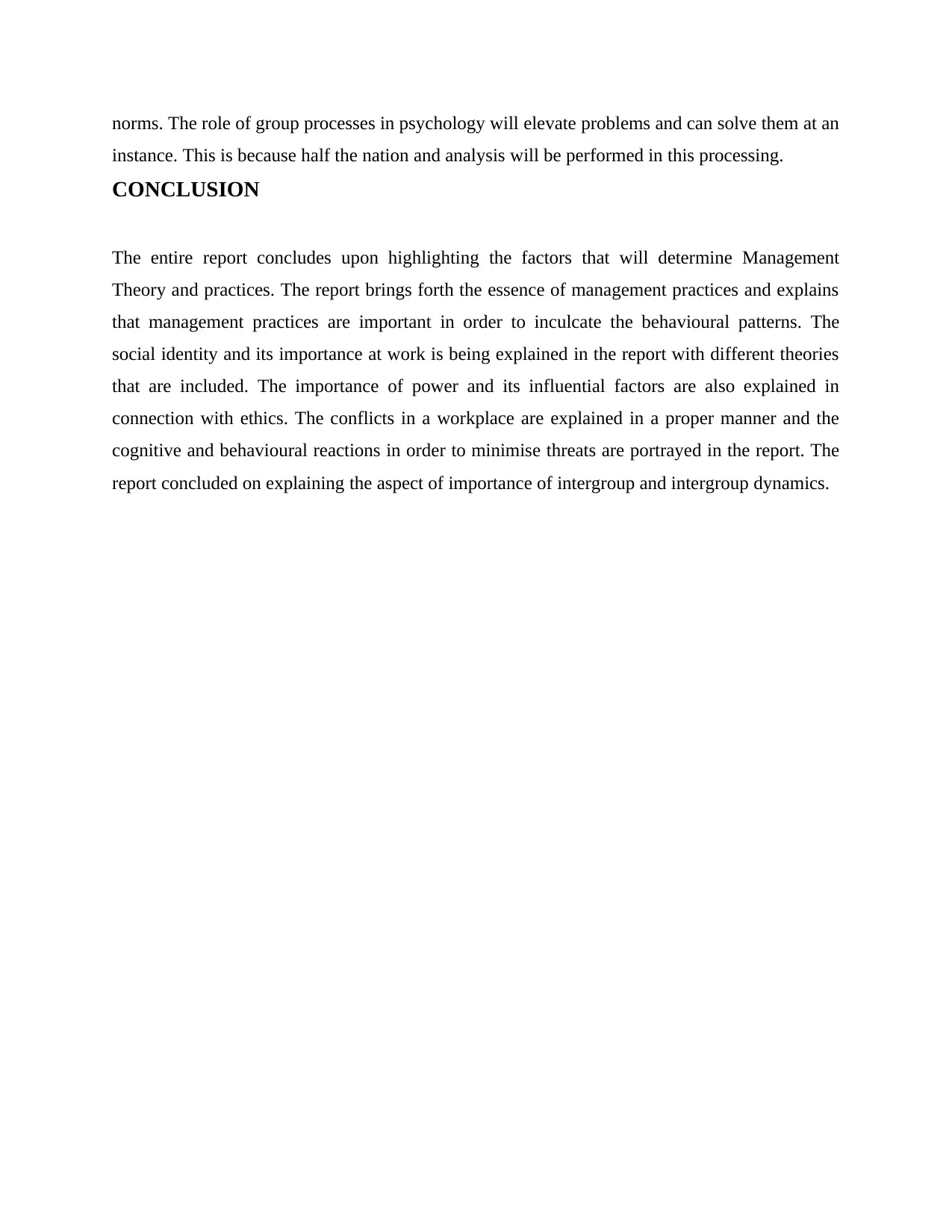
norms. The role of group processes in psychology will elevate problems and can solve them at an
instance. This is because half the nation and analysis will be performed in this processing.
CONCLUSION
The entire report concludes upon highlighting the factors that will determine Management
Theory and practices. The report brings forth the essence of management practices and explains
that management practices are important in order to inculcate the behavioural patterns. The
social identity and its importance at work is being explained in the report with different theories
that are included. The importance of power and its influential factors are also explained in
connection with ethics. The conflicts in a workplace are explained in a proper manner and the
cognitive and behavioural reactions in order to minimise threats are portrayed in the report. The
report concluded on explaining the aspect of importance of intergroup and intergroup dynamics.
instance. This is because half the nation and analysis will be performed in this processing.
CONCLUSION
The entire report concludes upon highlighting the factors that will determine Management
Theory and practices. The report brings forth the essence of management practices and explains
that management practices are important in order to inculcate the behavioural patterns. The
social identity and its importance at work is being explained in the report with different theories
that are included. The importance of power and its influential factors are also explained in
connection with ethics. The conflicts in a workplace are explained in a proper manner and the
cognitive and behavioural reactions in order to minimise threats are portrayed in the report. The
report concluded on explaining the aspect of importance of intergroup and intergroup dynamics.
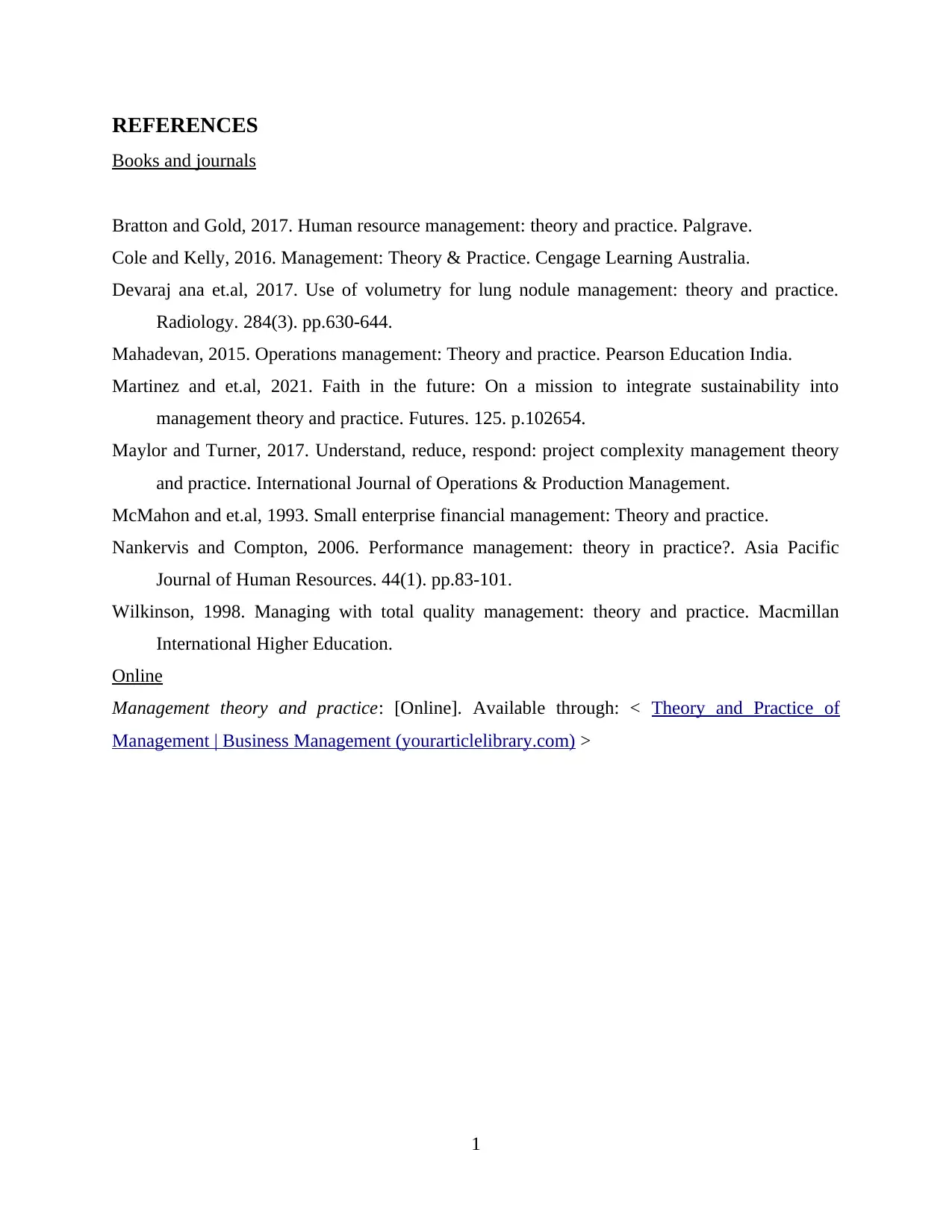
REFERENCES
Books and journals
Bratton and Gold, 2017. Human resource management: theory and practice. Palgrave.
Cole and Kelly, 2016. Management: Theory & Practice. Cengage Learning Australia.
Devaraj ana et.al, 2017. Use of volumetry for lung nodule management: theory and practice.
Radiology. 284(3). pp.630-644.
Mahadevan, 2015. Operations management: Theory and practice. Pearson Education India.
Martinez and et.al, 2021. Faith in the future: On a mission to integrate sustainability into
management theory and practice. Futures. 125. p.102654.
Maylor and Turner, 2017. Understand, reduce, respond: project complexity management theory
and practice. International Journal of Operations & Production Management.
McMahon and et.al, 1993. Small enterprise financial management: Theory and practice.
Nankervis and Compton, 2006. Performance management: theory in practice?. Asia Pacific
Journal of Human Resources. 44(1). pp.83-101.
Wilkinson, 1998. Managing with total quality management: theory and practice. Macmillan
International Higher Education.
Online
Management theory and practice: [Online]. Available through: < Theory and Practice of
Management | Business Management (yourarticlelibrary.com) >
1
Books and journals
Bratton and Gold, 2017. Human resource management: theory and practice. Palgrave.
Cole and Kelly, 2016. Management: Theory & Practice. Cengage Learning Australia.
Devaraj ana et.al, 2017. Use of volumetry for lung nodule management: theory and practice.
Radiology. 284(3). pp.630-644.
Mahadevan, 2015. Operations management: Theory and practice. Pearson Education India.
Martinez and et.al, 2021. Faith in the future: On a mission to integrate sustainability into
management theory and practice. Futures. 125. p.102654.
Maylor and Turner, 2017. Understand, reduce, respond: project complexity management theory
and practice. International Journal of Operations & Production Management.
McMahon and et.al, 1993. Small enterprise financial management: Theory and practice.
Nankervis and Compton, 2006. Performance management: theory in practice?. Asia Pacific
Journal of Human Resources. 44(1). pp.83-101.
Wilkinson, 1998. Managing with total quality management: theory and practice. Macmillan
International Higher Education.
Online
Management theory and practice: [Online]. Available through: < Theory and Practice of
Management | Business Management (yourarticlelibrary.com) >
1
⊘ This is a preview!⊘
Do you want full access?
Subscribe today to unlock all pages.

Trusted by 1+ million students worldwide

2
1 out of 10
Related Documents
Your All-in-One AI-Powered Toolkit for Academic Success.
+13062052269
info@desklib.com
Available 24*7 on WhatsApp / Email
![[object Object]](/_next/static/media/star-bottom.7253800d.svg)
Unlock your academic potential
Copyright © 2020–2026 A2Z Services. All Rights Reserved. Developed and managed by ZUCOL.





